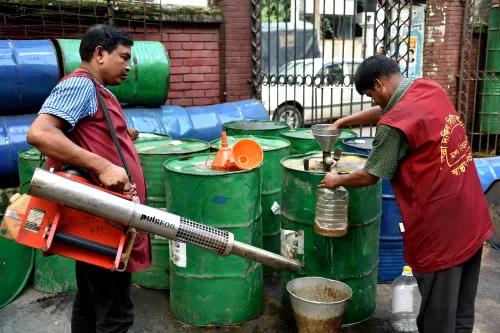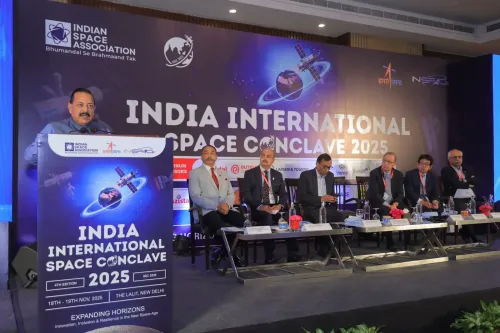What Guidelines Has the Karnataka Government Released for Sabarimala Pilgrims?

Synopsis
Key Takeaways
- Guidelines issued for Sabarimala pilgrims.
- Amoebic meningoencephalitis caused by Naegleria fowleri is a risk.
- Prevent water from entering the nose while bathing.
- Seek medical help if symptoms develop.
- Public health measures are crucial during the pilgrimage.
Bengaluru, Nov 18 (NationPress) The Karnataka government has released a set of guidelines for Sabarimala pilgrims in response to reported incidents of amoebic meningoencephalitis, also known as brain fever, due to the Naegleria fowleri microorganism, infamously referred to as the “brain-eating amoeba.” These guidelines are designed to safeguard public health and implement necessary preventive measures.
The Commissioner of the Health Department emphasized on Tuesday that Naegleria fowleri is a free-living amoeba typically found in warm freshwater and sand, including stagnant water, puddles, and swimming pools. Importantly, the infection is not transmissible from person to person, nor does it arise from consuming contaminated water.
This highly virulent microorganism can lead to the rare but potentially fatal condition of amoebic meningoencephalitis when contaminated water enters the nasal passages. Pilgrims are advised to take precautions to prevent water from entering their noses while bathing, and the use of nose clips is strongly recommended.
If any individual experiences symptoms such as fever, severe headache, nausea, vomiting, neck stiffness, altered mental state, or behavioral changes after exposure to water, they must seek immediate medical attention at the closest government hospital, as highlighted by the Health Department.
As the annual pilgrimage season for Sabarimala commenced, Kerala's Health Department issued a cautionary advisory urging devotees to take care that water does not enter the body through the nose while bathing.
This advisory comes amid a surge in amoebic meningoencephalitis cases reported in the state.
Karnataka is known for its numerous Ayyappan temples, and a significant number of devotees from the state flock to the shrine.
Within just 48 hours of the temple's opening for the annual 'mandala-makaravilakku' pilgrimage season, nearly two lakh devotees arrived at the Lord Ayyappa shrine in Sabarimala, located in Pathanamthitta. Large crowds filled the pilgrimage route from Pamba, the foothills of Sabarimala, to the Sannidhanam, causing many to endure hours-long delays in their ascent.
According to an official statement, on November 16, the temple's opening day, 53,278 pilgrims visited the shrine. The overwhelming influx of visitors has resulted in chaotic conditions, with queues for 'darshan' extending up to 10 hours, as reported by local authorities.









